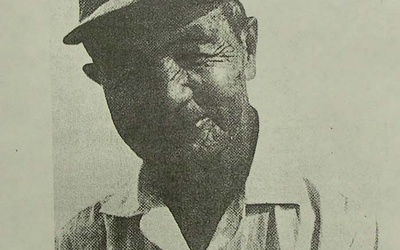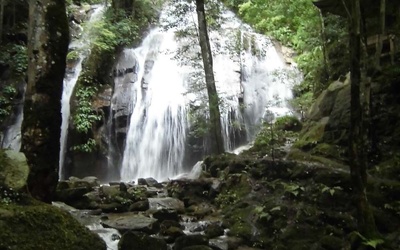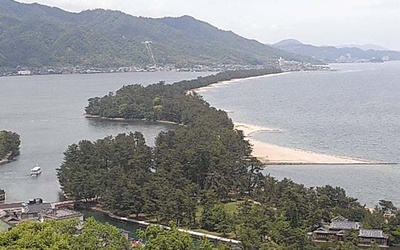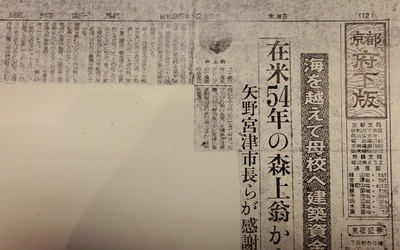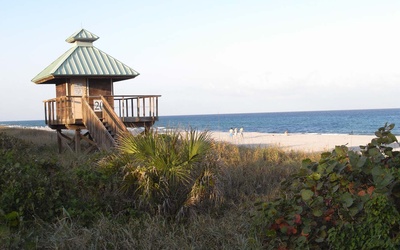A lonely longing for home - From the letters of Morikami Suketsugu, a Japanese immigrant in Florida
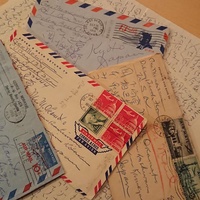
In the early 20th century, the Japanese village of Yamato Colony appeared in southern Florida. Morikami Sukeji (George Morikami), who immigrated from Miyazu, Kyoto City as a farmer and pioneer, is the man who laid the foundation for the Morikami Museum and Japanese Gardens, which is now located in Florida. He stayed on after the colony was dissolved and disappeared before the war, and continued farming alone through the war. He ended up donating a huge amount of land, leaving his name in the local area. He remained single throughout his life and never returned to Japan, but he was more homesick than most and continued to write letters to Japan. He corresponded frequently with the Okamoto family, including the wife and daughters of his late brother. Although he never met them, he treated them like family and sent them information about the situation and his thoughts in the area. The letters he left behind trace his life and lonely homesickness as a record of one generation.
Stories from this series
Episode 12: Attacked by a Robber
July 12, 2019 • Ryusuke Kawai
Morikami Sukeji, who traveled to America as a member of the Yamato Colony in South Florida and remained there alone until the end of his life after the colony was disbanded, continued to write letters to his sister-in-law and her family, who had lost her husband (Sukeji's younger brother) after the war. As Sukeji, who was living alone in the suburbs, was pondering whether to return to America or to invite his sister-in-law and her family to America, one day …
No. 11: Seeking new ventures despite poor performance
June 28, 2019 • Ryusuke Kawai
Morikami Sukeji, who traveled to the United States as a member of the Yamato Colony in South Florida and remained there alone until the end of his life after the colony was disbanded, continued to write letters to his sister-in-law and her family, whose husband (Sukeji's younger brother) had died after the war. Now in his sixties, he often complained of poor health and became faint-hearted after hearing of the deaths of his compatriots, but he was always thinking about …
Episode 10: My nephew who called me "father" passes away
June 14, 2019 • Ryusuke Kawai
Morikami Sukeji, who traveled to America as a member of the Yamato Colony in South Florida and remained there alone until the end of his life after the colony was disbanded, continues to write letters to his sister-in-law and her family, who lost her husband (Sukeji's younger brother) after the war. As they come to feel as if they were real family, one day they learn that their nephew is ill. They encourage and comfort their nephew and his sister-in-law, …
Part 9: I want to return to Kyoto and spend the rest of my life there
May 24, 2019 • Ryusuke Kawai
Morikami Sukeji, who came to America as a member of the Yamato Colony in South Florida and remained there alone until the end of his life after the colony was dissolved, continues to write letters to his sister-in-law and her family, who lost her husband (Sukeji's younger brother) after the war. Over the years of correspondence, they come to feel like they are a real family, and even talk about living together. However, there are many obstacles. * * * …
Episode 8: There's still work to be done!
May 10, 2019 • Ryusuke Kawai
Morikami Sukeji, who traveled to the United States as a member of the Yamato Colony in South Florida and remained there alone until the end of his life after the colony was dissolved, continued to write letters to his sister-in-law and her family after the war. Always thinking of his hometown, he devoted himself to farm work. He heard people say to him, "What's the point of working so hard when you don't have a wife or children? You're an …
No. 7 Life without mirrors
April 26, 2019 • Ryusuke Kawai
Morikami Sukeji, who traveled to the United States as a member of the Yamato Colony in South Florida and stayed there alone until the end of his life after the colony was dissolved, continued to write letters to his sister-in-law and her family after the war. His days were filled with carefreeness and loneliness, and he worked hard at farm work, remembering the cherry blossoms he had seen in Kyoto. Even though he was in Florida, he dreamed of traveling …

